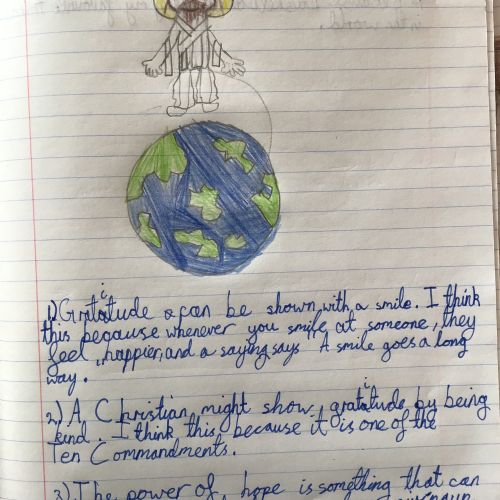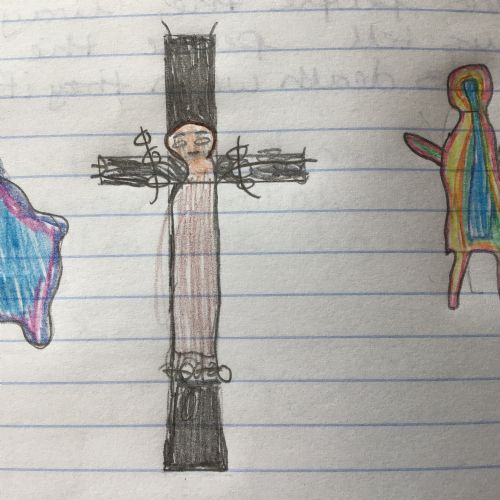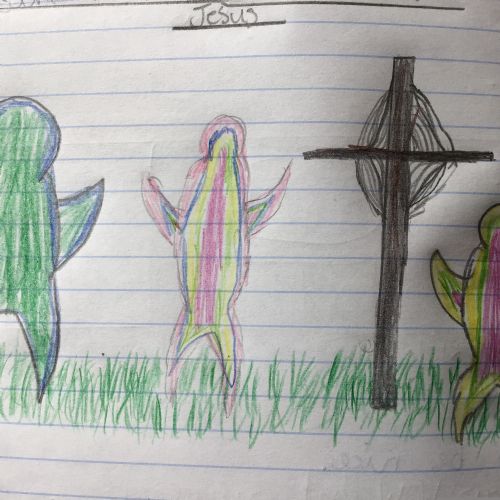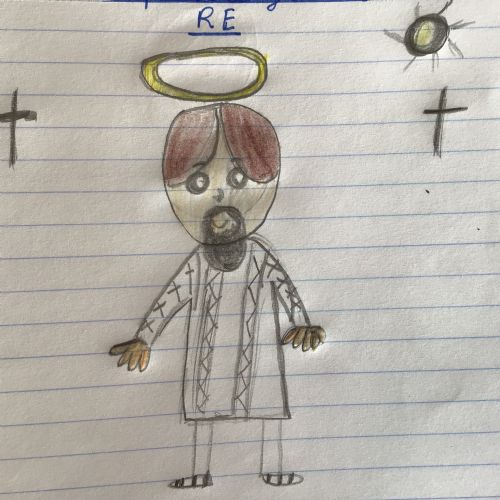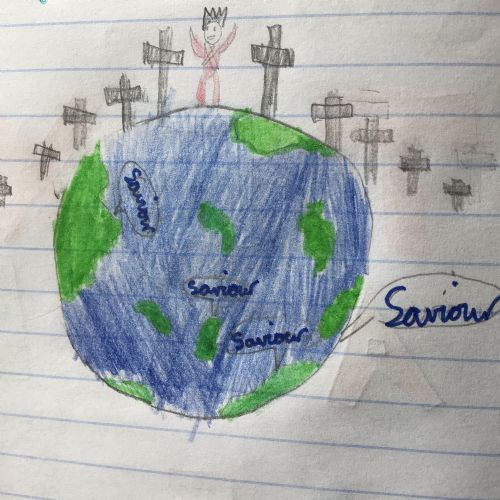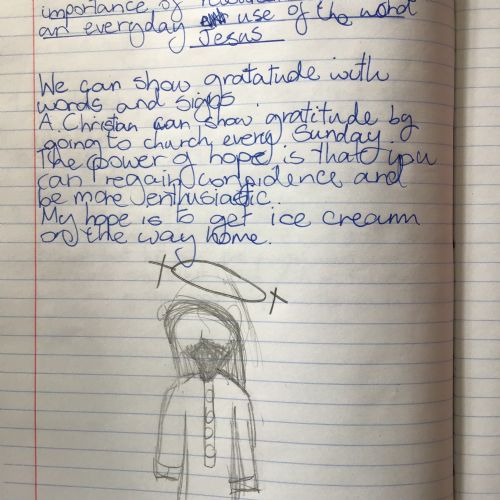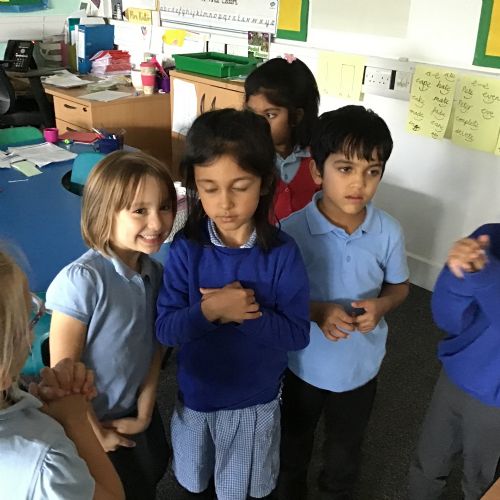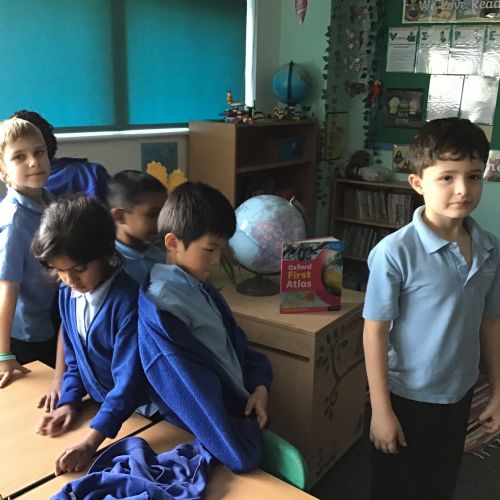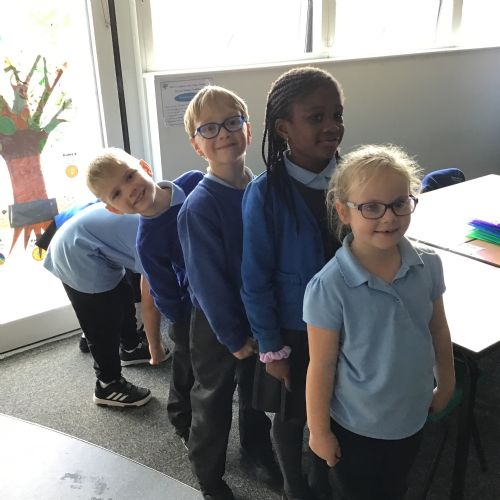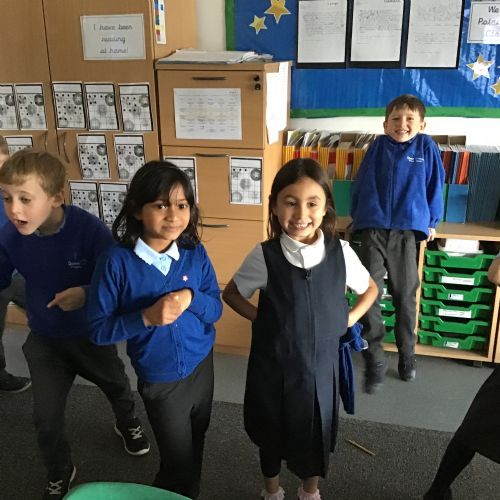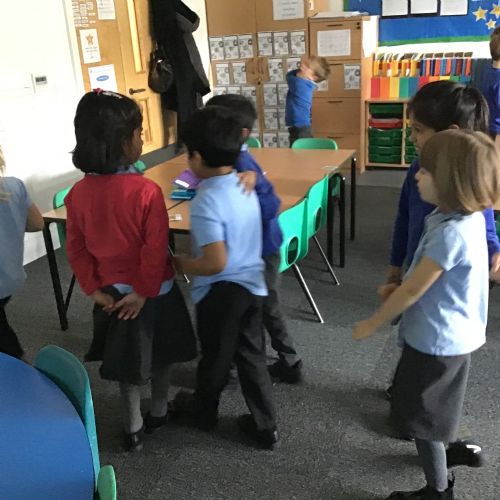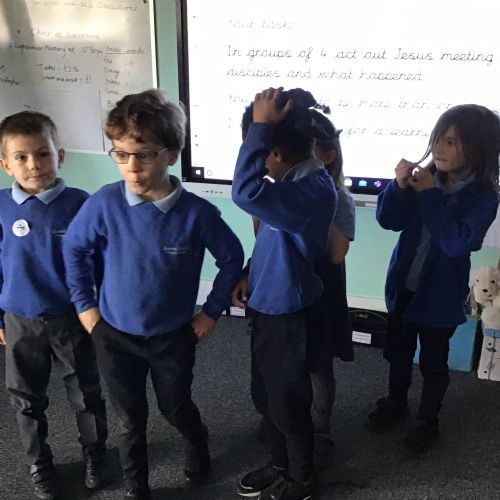Religious Education
Intent
At the Queens’ Federation we aim to foster ‘Learning for Life.’
We will provide a rich, relevant and inspirational curriculum that promotes a lifelong love of learning and equips our pupils with the key knowledge and understanding, skills and personal qualities that they will need to thrive in a rapidly changing world. Our curriculum is designed to be relevant to our children and is linked to the context of our school and the local community.
At the Queens’ Federation, the aim of our RE curriculum is to promote religious understanding, respect and open-mindedness towards others with different faiths and beliefs. It also encourages pupils to develop their sense of identity and belonging through self-awareness and reflection. The curriculum engages pupils in an enquiry approach where they can develop an understanding and an appreciation of the beliefs and cultural practices of the local, national and wider global community.
Implementation
Our RE curriculum is based on the 2018 Cambridgeshire Agreed Syllabus and focuses on the development of religious literacy. In each year, there is a focus on Christianity and opportunities for pupils to learn about and evaluate their own views on other world religions. Pupils also learn to appreciate their own and the beliefs of others. ‘Big Question’ units of work encourage and promote the contemplation of key concepts and themes within religions and the comparison of these with responses in other faiths, religions and belief systems. Throughout each stage of learning, pupils focus on contexts relating to their family, the local community, national and international societies.
The RE curriculum is enriched through school assemblies and the use of visitors and visits. These have a valuable role to play in providing pupils with access to outside experiences and expertise. They also provide a link with the wider community. Our pupils will also have access to first hand experiences of other faiths through visits to different places of worship and by meeting with people of different faiths. Pupils in KS1 participate in a Christmas performance and perform to friends and family sharing their understanding of the meaning of Christmas.
We view assessment as a holistic process, which takes place in every lesson through observation of, in questioning and in conversation with pupils and in the production of written outcomes. Religious Education assessment criteria set out the key knowledge and skills that a pupil should achieve at the end of each unit of work.
Impact
By the end of their time at the Queens’ Federation, pupils will be able to hold a balanced and well-informed conversation about religion and belief, demonstrating respect for the beliefs, values and traditions of others. They will have a clear understanding of the world in which they live and the different faiths that they will meet throughout their lives. Their knowledge and actions will support cohesion within and beyond the school community. Pupil outcomes evidence a broad and balanced religious education curriculum and at the end of each year, pupils achieve age related expectations and retain the knowledge and skills learnt from each unit of work.
Yearly Overview
Unlike literacy and maths, R.E. is often taught through a full day or week’s learning on a specific question enquiring into a religion and its practices. This gives the children the opportunity to engage fully with the topic. The principal religions within the local community and the UK will be covered in different year groups. The information below outlines in more detail the religions and questions covered in each year group. Many students will be given the opportunity to take part in philosophy sessions or clubs. Research has shown that philosophy aids deeper thinking and academic engagement.
| Autumn 1 | Autumn 2 | Spring 1 | Spring 2 | Summer 1 | Summer 2 | |
|---|---|---|---|---|---|---|
| Y1 |
Christianity: Belonging – What difference does being a Christian make to a family? |
Christianity: Celebration – Which story is important to Christians at Christmas? |
Islam: Belonging – What difference does being Muslim make to a family? |
Christianity: Celebration - Why was Jesus welcomed like a king on Palm Sunday? |
Christianity: Stories – What did Jesus teach about God in his parables? |
Cross Religion: Big Questions - How is the birth of a baby celebrated? |
| Y2 |
Christianity: Leaders – Why do Christians trust Jesus and follow him? |
Christianity: Leaders – Why do Christians trust Jesus and follow him? |
Judaism: Belonging – What is important to Jewish families? |
Christianity: Symbols – What are the best symbols of Jesus’ death and resurrection at Easter? |
Sikhism: Belonging – How do Sikh beliefs influence how Sikhs live? |
Cross Religion: Big Questions: - How do people show that they are thankful? |
| Y3 |
Christianity: Impact on Individuals – Why is the Bible important to Christians today? |
Hinduism: Engage – How does being a Hindu impact a child’s life? |
Hinduism: Impact on Individuals – Why do Hindus want to collect good karma? |
Christianity: Celebration - Is Easter a festival of new life or sacrifice? |
Christianity: Believing – What can different churches tell us about the variety of Christian beliefs? / Do all Christians believe exactly the same? |
Cross Religion: Big Questions - How and why do people care for our world? |
| Y4 |
Christianity: Leaders – What difference did Paul’s conversion make to Christians? |
Christianity: Beliefs in Action – What do Christians mean when they talk about the Kingdom of God? |
Christianity: Leaders - Could Jesus really perform miracles? |
Islam: Impact on Individuals – How do Muslims show their submission and obedience to Allah? |
Islam: Leaders – Why do Muslims call Muhammed the ‘Seal of the Prophets?’ |
Cross Religion: Big Questions - How and why do people help those without a home? |
| Y5 |
Judaism: Teachings - What influences Jewish people? |
Humanism: Engage – Why do humanists say happiness is the goal of life? |
Christianity: Leader – Who do people say I am? |
Christianity: Commitment - What is the best way for Christians to show commitment to God? |
Christianity: Beliefs – How did the world begin? |
Cross Religion: Big Questions - How can we answer life’s ultimate questions? |
| Y6 |
Buddhism: Symbols and Religious Expression – How did Buddha teach his followers to find enlightenment ? |
Christianity: Beliefs – How do Christians show their belief that Jesus is God incarnate ? |
Christianity: Resurrection – Should believing in the resurrection change how Christians view life and death ? |
Buddhism: Journey of Life and Death – How does the Triple Refuge help Buddhists in their journey through life ? |
Cross Religion : Big Questions – Being Me, Moving On ? |
Cross Religion : Big Questions – Being Me, Moving On ? |
Information for Parents
At Queens’ Federation we openly encourage parents, other relations and members of specific faiths to come in to provide a personal and accurate explanation of their beliefs. These experiences are invaluable to the children and their understanding, due to the fact that they hear first-hand what it means to be part of different faith communities. If you would be interested in helping out in this way please speak to your class teacher.
Pupils Voice
Miss Stubbs has been talking to pupils throughout the school, finding out about learning in RE. RE stands for Religious Education. At Queen Emma, pupils in KS1 learn about Christianity, Islam, Judaism and Sikhism whilst pupils in KS2 develop their understanding of these religions and begin to learn about Hinduism, Humanism and Buddhism too. We also aim to promote religious understanding, respect and open-mindedness towards others with different faiths and beliefs. Our RE curriculum also encourages pupils to develop their sense of identity and belonging through self-awareness and reflection.
All of the pupils spoke very positively about their learning in RE and were very knowledgeable about a wide range of world religions. They all look forward to learning more in the future too.
Pupils were asked ‘Why is it important to learn about RE?’
- We learn what different people do and say and feel. It helps us to not laugh at other people and their religions. It helps us to be kind to others. (Y2)
- In RE, we learn about what other people believe in, what other people do, what they wear. (Y3)
- We learn about other people and what is important to them. (Y4)
- We know about different religions, how it feels to be part of their religion and how to support and help others. It’s good to find out similarities and differences between religions. (Y4)
- It’s important to learn about different people’s cultures and develop an understanding of others. (Y4)
- You get to find out things about other people and their religions so that when you talk to others, you can understand their beliefs. (Y5)
- We learn about RE so that there is no misunderstanding about different things, we don’t say offensive things to others and we are aware of what is important in other people’s religions. (Y6)
Pupils were then asked what it would be like if we didn’t learn about RE.
- We would not be kind about other religions and wouldn’t show respect to others. You would only know what you believe in and not what others believe in. If we learn about others, we can help others. (Y3)
- If we went to a different country or met someone different to us, we might offend them and they may feel disrespected. (Y3)
- If we didn’t learn about RE, you wouldn’t know about different people and you might say something rude or disrespectful to them. (Y5)
Pupils could talk about their current learning. Pupils in Year 1 told Miss Stubbs all about the events of Palm Sunday. ‘People waved palm leaves at Jesus, they put them on the floor, like a red carpet.’ Year 3 shared their knowledge of their Hinduism unit of work ‘Why do Hindus want to collect good karma?’ ‘It’s like a snakes and ladders game. If you do a good action, you go up a ladder, if you do a bad action, you go down a snake. If you get to the top, you are born again.’ Pupils in Year 5 talked about their Christianity unit of work ‘What is the best way for Christians to show their commitment to God?’ ‘Christians go to church, pray and celebrate Jesus. They sing hymns too.’
Pupils take part in a wide range of activities in RE lessons. Pupils in Year 1 listen to a range of stories, take on roles of others whilst acting out stories from the Bible, use video clips to support learning, share thoughts and knowledge during circle time activities and link learning in art and RE when creating palm leaves as part of their unit of work focusing on the events of Palm Sunday. Pupils in Year 2 also use strategies such as role play, drama techniques and class and paired discussions to facilitate learning. A wide range of written work is produced in Year 3. Pupils create fact files, cartoon strips and posters to share their knowledge about Hindu gods, the story of Rama and Sita and celebrations linked to Easter. Artefacts are used in Year 3 to demonstrate the act of ‘puja’ during a Hinduism unit of work and a range of stories from both the Bible and the Panchatantra are used as a basis for learning. Pupils in Year 4 use role play, video clips and stories to support their learning and learn about the lives and impact of key individuals such as Mother Theresa and the roles of local and national charities. Year 5 incorporate time for reflection and discussion into lessons and study poems to help identify similarities and differences between Christian and Humanist celebrations. Pupils in Year 6 use bibles to help them to add more detail and quotations to their work, use stories and works of art to support discussions about incarnation and practise meditation to support their understanding of Buddhist beliefs.
Finally, the pupils were asked ‘How the 7 Habits help with their learning in RE?’
- I certainly think you need to use the habits when learning in RE. I think you need to use Habit 6: Synergize – you help each other learn about different religions. (Y2)
- You use Habit 5: Seek First to Understand – you listen about their religion and then you can understand. (Y2)
- I think Habit 6 would fit. You have to work together. Habit 1 would fit too. You have to be responsible for your actions – like in Hinduism and karma. (Y3)
- Habit 5 helps us to listen and then learn about other religions and other people. (Y3)
- I think the habits really fit in with RE. The 7 habits are what many religions do and follow. Habit 4 helps people be fair about everyone. Habit 5 helps people listen to each other. People pray together to one God and believe that God will help them. This links with Habit 6. Habit 7 helps us to look after ourselves. (Y4)
- The 7th habit helps you to be a better person, just like RE does. RE helps you to understand others and learn about what is important to them. (Y5)
Well done to everyone who took part in these discussions. It was great to hear our pupils talk enthusiastically about their learning in RE and be excited to learn more in the future.
Examples of Learning
The Year 6's have been creating art based around the Easter story and the resurrection. Here are some of the amazing results!
Year 2 learnt that Christians believed and put their faith in Jesus. They discussed who in the class they trust and like to be with. The children learnt about disciples and how Jesus chose his disciples. They then role-played this in groups.

